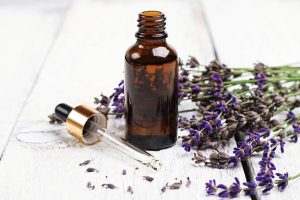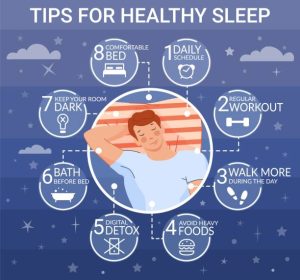Table of Contents
ToggleAre you feeling groggy, lethargic, and unfocused? It could be due to a lack of sleep! As much as we’d love to stay up late binge-watching our favorite shows or scrolling through social media, our bodies need a good night’s rest to function at their best. Sleep is crucial for our overall health and well-being. It allows our bodies to repair and rejuvenate, enhances our immune system, improves our memory and cognitive functions, and even helps regulate our emotions.
When inhaled or applied topically, essential oils stimulate the olfactory system and trigger the release of neurotransmitters like serotonin and dopamine, which can help regulate our sleep cycles and promote relaxation. So, if you’re looking for a natural and effective way to catch some Z’s, essential oils may just be the ticket!
Top 5 Essential Oils for Better Sleep
1. Lavender oil

Lavender essential oil, extracted through steam distillation from the flowers of the lavender plant, remains a widely favored choice. People have utilized this fragrant oil for centuries, valuing its ability to calm and soothe. It frequently finds application in aromatherapy to induce relaxation and improve sleep quality.
Benefits of Lavender Oil for Sleep
Lavender oil is known for its ability to help people relax and fall asleep faster. A study published in the journal Evidence-Based Complementary and Alternative Medicine found that inhaling lavender oil before bedtime can improve the quality of sleep, increase sleep duration, and reduce the time it takes to fall asleep. The relaxing properties of lavender oil are due to its chemical compounds, including linalool and linalyl acetate, which have been shown to reduce anxiety and promote relaxation.
How to Use Lavender Oil for Better Sleep
There are several ways to use lavender oil for better sleep. One popular method is to diffuse it in a diffuser or vaporizer. Simply add a few drops of lavender oil to the water in the diffuser and turn it on before going to bed. You can also apply lavender oil topically by diluting it with a carrier oil like coconut or jojoba oil and massaging it onto your temples, neck, and chest before bedtime. Another way to use lavender oil is to add a few drops to your bathwater before taking a relaxing bath.
Safety Precautions When Using Lavender Oil
While lavender oil is generally considered safe, it’s important to keep a few safety precautions in mind. First, always dilute lavender oil with a carrier oil before applying it topically, as undiluted essential oils can cause skin irritation. Pregnant or breastfeeding women should consult with their healthcare provider before using lavender oil, as some studies have suggested that it may have hormonal effects. Lastly, it’s important to store lavender oil in a cool, dry place and keep it out of reach of children and pets. Ingesting lavender oil can be toxic and cause serious harm.
2. Roman chamomile oil

is derived from the flowers of the chamomile plant, scientifically known as Anthemis nobilis. This essential oil is widely used for its calming and soothing properties, making it a popular choice for promoting better sleep and relaxation.
Benefits of Roman chamomile oil for sleep
Roman chamomile oil is a natural sedative that can help promote relaxation and reduce stress and anxiety. Its calming properties can help improve the quality of sleep and reduce symptoms of insomnia. In addition, the oil has anti-inflammatory and pain-relieving properties that can help relieve discomfort and pain, making it easier to fall asleep and stay asleep throughout the night.
How to use Roman chamomile oil for better sleep
There are several ways to use Roman chamomile oil to promote better sleep. One of the most effective methods is to diffuse the oil in a diffuser before bedtime. Simply add a few drops of the oil to the diffuser with water and let it run for 30-60 minutes before going to bed. This will help create a relaxing and calming atmosphere in the bedroom, promoting better sleep.
Another way to use Roman chamomile oil is to apply it topically to the skin. Mix a few drops of the oil with a carrier oil such as coconut or jojoba oil and massage it onto the skin before bedtime. This will help promote relaxation and reduce stress and anxiety, making it easier to fall asleep.
Safety precautions when using Roman chamomile oil
While Roman chamomile oil is generally safe to use, there are a few precautions that should be taken. It should not be ingested and should be used in small amounts when applied topically to the skin. In addition, pregnant women should avoid using this oil, as it can stimulate contractions and potentially cause miscarriage. It is also important to test the oil on a small area of skin before applying it to larger areas to check for any allergic reactions or skin sensitivity.
3. Benefits of Bergamot

Bergamot oil, a citrus fruit extract, is known for its calming and relaxing properties, making it a popular choice for those looking to improve their sleep quality. Here are some benefits, usage tips, and safety precautions of bergamot oil for sleep:
Benefits of bergamot oil
Bergamot oil is considered an effective natural remedy for improving sleep quality due to its sedative and relaxing properties. It helps to reduce stress and anxiety levels, calm the mind and body, and promote a peaceful state of mind, leading to a better quality of sleep.
How to use bergamot oil
There are several ways to use bergamot oil to promote better sleep. One of the most popular methods is to diffuse it into the air using a diffuser. Simply add a few drops of bergamot oil to the diffuser, turn it on, and let the aroma fill the room. Alternatively, you can add a few drops of bergamot oil to your bathwater or mix it with a carrier oil, such as coconut or almond oil, and massage it onto your skin.
Safety precautions when using bergamot oil
Bergamot oil is generally considered safe when used in small doses. It is important to note that bergamot oil can increase photosensitivity, which means that it can cause skin irritation or sunburn when exposed to sunlight. Therefore, it is recommended to avoid direct sunlight or tanning beds for up to 12 hours after using bergamot oil. Pregnant women and children should avoid using bergamot oil, and anyone with sensitive skin should dilute it with a carrier oil before use.
4. Valerian Oil

If you’re struggling with insomnia or simply having trouble getting a good night’s sleep, valerian oil may be the answer you’ve been looking for. Valerian oil is derived from the roots of the valerian plant, which has been used for centuries as a natural sleep aid.
Benefits of Valerian Oil for Sleep
Valerian oil has been shown to have a calming effect on the body, making it an effective treatment for insomnia and other sleep disorders. Studies have found that valerian oil can help people fall asleep faster and stay asleep longer, without causing the grogginess or other side effects associated with prescription sleep aids. In addition, valerian oil has been shown to reduce anxiety and promote relaxation, which can also help improve sleep quality.
How to Use Valerian Oil for Better Sleep
There are several ways to use valerian oil to promote better sleep. One popular method is to add a few drops of valerian oil to a diffuser or vaporizer and inhale the scent before bedtime. You can also apply a few drops of valerian oil directly to your pillow or bedding to help promote relaxation. Another option is to add a few drops of valerian oil to a warm bath before bedtime to help soothe sore muscles and calm the mind.
Safety Precautions When Using Valerian Oil
While valerian oil is generally considered safe, there are some precautions you should F mind when using it. Valerian oil should not be used during pregnancy or breastfeeding, as its safety during these times has not been established. In addition, valerian oil may interact with certain medications, such as sedatives or anti-anxiety drugs, so it’s important to consult with a healthcare professional before using valerian oil if you’re taking any medications.
5. Ylang Ylang Oil

Ylang-ylang oil is an essential oil derived from the flowers of the ylang-ylang tree, which is native to tropical Asia. This fragrant oil has been used for centuries for its therapeutic properties, including its ability to promote relaxation and improve sleep quality.
Benefits of Ylang Ylang Oil for Sleep
Ylang-ylang oil is known for its calming and sedative effects, making it a popular choice for those who struggle with insomnia or other sleep disorders. This oil has been shown to reduce stress and anxiety, which can interfere with sleep quality. Ylang-ylang oil also has a pleasant floral scent that can promote relaxation and a sense of calmness, helping to create a peaceful environment for restful sleep.
How to Use Ylang Ylang Oil for Better Sleep
There are several ways to use ylang-ylang oil for better sleep. One of the easiest ways is to add a few drops to a diffuser and inhale the scent before bedtime. Another option is to dilute the oil with a carrier oil, such as coconut oil, and massage it onto the skin. Applying ylang-ylang oil to the temples, wrists, and feet can help promote relaxation and calmness. You can also add a few drops of ylang-ylang oil to your bathwater for a soothing and calming experience.
Safety Precautions When Using Ylang-Ylang Oil
Although most people generally consider ylang-ylang oil safe, it is important to exercise caution when using it. The oil has the potential to cause skin irritation in some people; thus, it is advisable to dilute it before applying it to the skin. Furthermore, one should avoid ingesting ylang-ylang oil since it can be toxic in large quantities. Pregnant women and young children should refrain from using ylang-ylang oil as its safety for these groups has not been firmly established.
How to Use Essential Oils for Better Sleep

If you have trouble sleeping, you may have considered trying essential oils. Concentrated plant extracts can have a calming effect on the body and mind, and these extracts are known as essential oils. Here are some ways you can use essential oils to improve your sleep:
Diffusion
Diffusion is a popular method of using essential oils. You can use a diffuser to disperse the oil into the air in your bedroom. This creates a calming and soothing atmosphere that can help you relax and fall asleep. Just add a few drops of your favorite essential oil to the diffuser, turn it on, and let it do its job.
Topical application
Another way to use essential oils is by applying them topically. Dilute a few drops of your chosen essential oil with a carrier oil, such as coconut or jojoba oil, and apply it to your skin. You can apply the oil to your wrists, temples, or the bottoms of your feet. This method can be especially effective if you combine it with a relaxing massage.
Bathing
Adding a few drops of essential oil to your bath can also help you sleep better. The warm water and relaxing scent can soothe your muscles and calm your mind. Just add a few drops of your chosen essential oil to your bathwater, and soak for 15-20 minutes before bed.
Inhalation
Inhalation is another way to use essential oils. You can add a few drops of essential oil to a bowl of hot water, and inhale the steam by placing a towel over your head and breathing deeply. This can help clear your sinuses and relax your body.
Safety Precautions when Using Essential Oils

Essential oils have become increasingly popular as a natural remedy for improving sleep. It is important to take certain safety precautions when using essential oils to avoid any potential adverse effects. Here are some essential safety measures to consider before using essential oils for better sleep:
Dilution Guidelines:
Essential oils are highly concentrated and should never be used directly on the skin without dilution. To ensure safety, it is important to dilute essential oils in a carrier oil such as coconut or almond oil. A general rule of thumb is to use one drop of essential oil per teaspoon of carrier oil for adults. This ratio may vary depending on the type of essential oil and the intended use.
Skin Sensitivity Test:
Before using any essential oil, it is important to perform a skin sensitivity test to determine if you are allergic or sensitive to the oil. To conduct this test, dilute the essential oil in a carrier oil and apply a small amount to a patch of skin on the inner arm. Wait for 24 hours and check for any redness, itching, or irritation. If there is a reaction, do not use the oil.
Interactions with Medication:
Essential oils can interact with certain medications, so it is important to consult with a healthcare professional before using any essential oils if you are taking medication. Some essential oils can increase the effect of certain medications, while others may reduce their effectiveness.
Risks for Pregnant and Breastfeeding Women:
Certain essential oils can pose risks for pregnant and breastfeeding women. It is important to avoid essential oils such as clary sage, juniper berry, and wintergreen during pregnancy, as they can cause uterine contractions. Some essential oils can be passed to the baby through breast milk, which may cause adverse effects.
Tips for Better Sleep

Getting a good night’s sleep is crucial for our physical and mental well-being. Many of us struggle with falling asleep or staying asleep throughout the night. Here are some tips for better sleep that you can incorporate into your routine:
Establishing a Bedtime Routine
One of the best ways to signal your body that it’s time to sleep is to establish a consistent bedtime routine. This routine can include getting a warm bath, reading a book, or practicing relaxation techniques like yoga or meditation. Try to stick to this routine as much as possible, even on weekends or holidays, to help regulate your body’s natural sleep-wake cycle.
Avoiding Electronic Devices Before Bed
The blue light emitted by electronic devices such as smartphones, tablets, and televisions can disrupt our body’s natural sleep cycle. Avoid using electronic devices for at least an hour before bed to allow your brain to wind down and prepare for sleep. Instead, try reading a book or listening to calming music.
Creating a Comfortable Sleep Environment
Your sleeping environment can have a significant impact on the quality of your sleep. Ensure that your room is cool, quiet, and dark to create a relaxing atmosphere. Invest in a comfortable mattress and pillows that support your preferred sleeping position. Consider using blackout curtains, earplugs, or a white noise machine to block out any unwanted distractions.
Managing Stress and Anxiety
Stress and anxiety can keep us awake at night, making it difficult to fall asleep or stay asleep. Incorporate stress-reducing techniques into your bedtime routine, such as practicing mindfulness or deep breathing exercises. Consider speaking to a therapist or counselor if stress and anxiety are affecting your sleep regularly.










